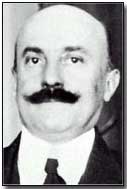Who's Who - Joseph Caillaux
 Joseph Caillaux (1863-1944) served as
Prime Minister of France for a few months in the immediate pre-war
years, but was jailed for a period at the close of the war for his radical
pacifist stance.
Joseph Caillaux (1863-1944) served as
Prime Minister of France for a few months in the immediate pre-war
years, but was jailed for a period at the close of the war for his radical
pacifist stance.
Born the son of a conservative politician on 30 March 1863, Caillaux studied law, emerging in 1886 with a degree which he used to gain entry to the Finance Ministry, where he worked as a deputy inspector.
Elected to the Chamber of Deputies in 1898 Caillaux established a reputation for himself as something of an expert on economic matters. In consequence he was appointed Minister of Finance in 1899, a post he held until 1902, and again from 1906-09.
During his tenure as Finance Minister Caillaux introduced a number of notable reforms but was ultimately unsuccessful in his ambition to introduce a French income tax system.
In the midst of the Agadir Crisis Caillaux served as Prime Minister, taking office on 27 June 1911. With war threatening with Germany - one which France was little capable of fighting at that stage - Caillaux made certain territorial concessions to Germany in Cameroon. While sensible and justifiable, these nonetheless succeeded in infuriating a large portion of the popular press, and consequently public and politicians alike.
Reviled for being a pro-German pacifist, Caillaux was obliged to resign in January 1912. Charges of pacifism were reawakened in 1913 with Caillaux's opposition to an extension of conscription; once again the popular press were at the forefront of criticism levelled at Caillaux.
Press criticism came to a head in 1914 when the editor of Le Figaro, Gaston Calmette, threatened to publish letters written between Caillaux and his then mistress (and current wife). Infuriated, Madame Caillaux sensationally shot Calmette, fatally wounding him. She was nevertheless acquitted at the subsequent trial that dominated popular and political conversation.
Opposed to French participation in the coming war, Caillaux was in favour of a negotiated peace once the First World War was underway - in which he again found himself at odds with popular opinion.
With the dismissal and then arrest of Louis Malvy, the Interior Minister, in 1917 (who was a close colleague and some argued puppet of Caillaux), the incoming Prime Minister Georges Clemenceau gave instructions for Caillaux to be imprisoned pending trial for an alleged conspiracy to govern France with a peace dictatorship.
Although he'd had his parliamentary immunity stripped of him on 22 December 1917, and had been formally arrested on 4 January 1918, Clemenceau took care to wait until an Allied victory was certain before actually placing Caillaux on trial (finally delayed until February 1920). He was acquitted of charges of treason but found guilty of "damage to the external security of the state".
He received a three year prison sentence, which was subsequently commuted; however he was deprived of his civil rights for a period of 10 years. With a change in political climate he was granted an amnesty on 14 July 1924 and returned to government the following April, serving in Paul Painleve's second ministry.
Elected to the Senate in 1927, Caillaux was made head of the Commission of Finance, and achieved renewed prominence in parliament. He returned to the Finance Ministry for just seven days at the start of June 1935, by which time - in the midst of the Great Depression - his political views had become more centrist.
Three years later, in 1938, Caillaux supported Edouard Daladier in his attempts to negotiate an agreement with the Nazis under Hitler. With the failure of these Caillaux retired from politics, declining to re-emerge at the invitation of the Vichy government.
Joseph Caillaux died in Mamers on 22 November 1944 at the age of 81.
Click here to view film footage of Caillaux with his Cabinet in 1911
A howitzer is any short cannon that delivers its shells in a high trajectory. The word is derived from an old German word for "catapult".
- Did you know?
